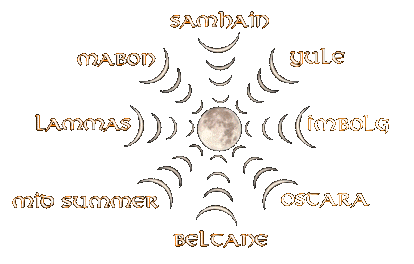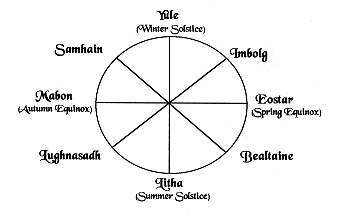
| 
|

In technical terms, the Wheel of the Year is the
celebration of eight Pagan festivals. These festivals are
based upon the cycle of the seasons, and the traditional
agricultural activities that are undertaken as a result
of the seasonal changes within the land. Four of these
celebrations are called the Lesser Sabbats, and these are
held on the Summer and Winter Solstices, and the Spring
and Autumn Equinoxes. The festivals between each of
these times are known as the Greater Sabbats. The Irish
Gaelic names of these Sabbats are Imbolg, Beltaine,
Lughnasadh, and Samhain.
Sometimes we make the mistake of seeing this cycle as
being outside of ourselves, but the Wheel of the Year
is not just a matter of a change of season. Beneath the
manifestation of this seasonal change, there are also
subtle energy shifts within the Earth.
These energy shifts affect us consciously and
unconsciously, so by understanding the flow and direction
of that energy, we can move with it harmoniously. Our
life-force permeates all of nature, and we are at one
with the forces of nature and the energies of the
seasons. The Wheel of the Year can therefore also be seen
as a reflection of the cycle of our own lives: birth,
growth, maturity, sexuality, reproduction, fulfilment,
harvest, death, and rebirth.
The Celts lived this cycle as they celebrated the turning
of the Wheel of the Year. At each festival they
physically, intellectually, emotionally, and spiritually
honoured themselves, their society, their ancestors and
their children. They did not consider their Goddess or
God to be outside of themselves... they were the deity!
They lived this concept consciously by loving nature, and
by knowing themselves to be an integral part of the
natural world. They saw and felt the waxing and waning of
the sun and moon within themselves and their society.
They celebrated each phase, honouring the challenges and
rewards that each season offered.
Attuning to the seasonal Wheel of the Year in this way,
brings new power and vitality to our lives, and
reinforces the idea of our connection to the Earth and
the Divine. This helps us to realise our responsibility
to the physical Earth, and also to the energies of the
Cosmos, for our thoughts as well as our deeds affect all.
At the time of the next festival, take time to
consciously connect to the Earth's energies. Become aware
of the natural forces permeating the earth and atmosphere
around you, as this can help you to make the connection
between universal energies and your own innermost
feelings. Celebrate the Sabbats by going somewhere
special. Follow your intuition and use your imagination.
Leave the text books of formal rituals at home, and
create a ritual that has meaning for you. And while
celebrating the Wheel of the Year, remember to honour
yourself, for in reality you and the cycle of the seasons
are one.  | 
| 
|


